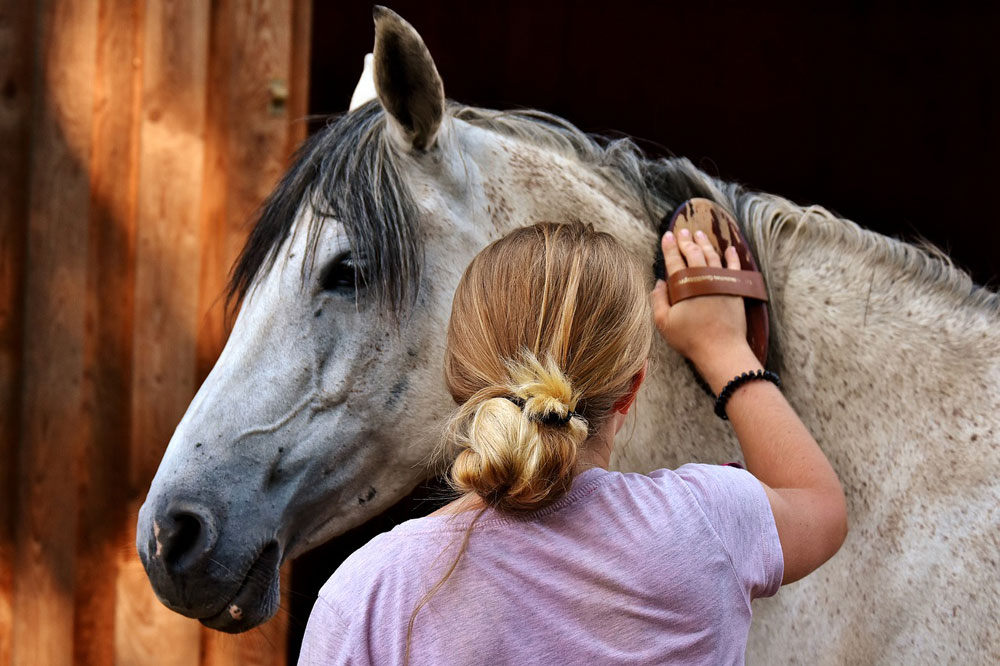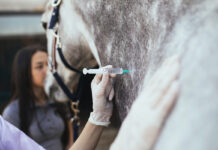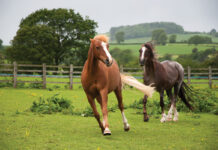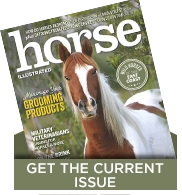Read for tips on how to develop a horse care routine.
Here, I’ll walk you through the steps I take before and after I ride. I’ll also help you avoid grooming and tack mistakes that could affect your safety and your horse’s wellbeing.

Right at the Start
Start with a soft curry tool (I like to use grooming gloves that have knobs on the palms) and massage your horse from head to tail on each side. Massaging your horse will help keep his skin and coat healthy.
You’ll also notice if your horse is sore anywhere—if he flinches or if his skin twinges, he may be sore. Grooming gloves also help me reach around my horse’s legs to clean as I check for bumps or swelling.
Finish off your horse’s body grooming with stiff then soft brushes to make sure all hair lies flat before you tack up. Pick out all your horse’s feet. Inspect each hoof and remove any stones.
Once your horse knows the order you’ll use for each grooming session, he’ll become comfortable with your routine. If you use your grooming tools in the same order each time, you’ll also make sure you don’t miss an important step.
Saddle Up
Check the underside of the pad for any debris (bits of hay, et cetera), then place the pad on your horse’s back. Make sure that it’s even on both sides. Once your saddle is on top, take time to pull the pad up into the gullet to relieve pressure on your horse’s withers. Also check that no leather pieces are caught under the saddle.
Move slowly as you reach for your horse’s cinch. Tighten the cinch in increments and without pulling too much at once. Having patience at this step can keep your horse from becoming “cinchy.”
If your horse does fear the cinch, make sure to untie him as you tighten the cinch calmly. I like to walk my horse a few steps before tightening the cinch again. This extra detail helps him feel the change, breathe and relax.
I always walk around my horse and do a final tack check before stepping into the saddle. Make sure that your bridle’s browband is square and the cheekpieces are well away from your horse’s eyes. See if the bit is level in his mouth. If you ride western, check your saddle’s offside straps. They should hang straight and not wrap under that saddle. Notice if the saddle pad is even on both sides as you walk around the front of your horse. Also notice if your stirrups are even.
Make it a habit to check your cinch one last time before you put your foot in the stirrup. Once you’re on, put pressure in your right leg to square your saddle (in case it shifted as you mounted up). Your horse should stand still as you square the saddle and until you give a clear cue to move forward. Start your ride with control!
A Good Ending
After I finish a ride, I step down and immediately loosen the saddle’s cinch. This detail tells my horse that his work is done and helps him feel more comfortable. He’ll cool down more quickly when he can breathe and relax.
Because this task becomes routine, my horse knows that if I dismount and don’t loosen the cinch, he’s still working. I get on and off a lot when I ride (especially during clinics), so this kind of consistency helps my horse know what’s expected.
Unbridle slowly, gently moving the headstall over the horse’s ears while holding slight upward pressure. Allow your horse to feel the bit loosen so he can open his mouth and spit out the bit. Never pull the bit out of a horse’s mouth. If he doesn’t promptly open his mouth to spit it out, wiggle the bit and wait patiently.
I rinse my bits and wipe down the bridle and tack after each ride. I use a brown shammy for tack and a blue shammy for horse bathing.
Every week, I spray the saddles with a leather cleaner to clean and protect the leather. I find it’s easiest to clean the saddle while it is on the horse’s back—it’s securely in place and at my level.
When the temperature is warm enough, I like to rinse off the horse’s sweat to help him cool off. If it’s too cool for a bath, I sponge off the sweaty areas with warm water and liniment. If it’s freezing, I rub my horse down with a shammy and walk him until he’s dry. Whether or not you bathe your horse after you ride, make sure to groom any matted hair anywhere the saddle and tack touched.
I don’t like seeing horses put away with sweat marks on their backs or heads. My horse tries hard to please me and gives me his best when I ask. I think it is important to give my horse a nice rubdown after a ride; it’s important bonding time and I believe it makes him feel appreciated.
JULIE GOODNIGHT shares her lessons on her RFD-TV show, Horse Master (also online at tv.juliegoodnight.com), and through clinics and expos. HEIDI MELOCCO (www.whole-picture.com) is a lifelong horsewoman, equine journalist, and photographer.
This article about developing a horse care routine originally appeared in the March 2018 issue of Horse Illustrated magazine. Click here to subscribe!







[…] Bron: Horse-illustrated […]